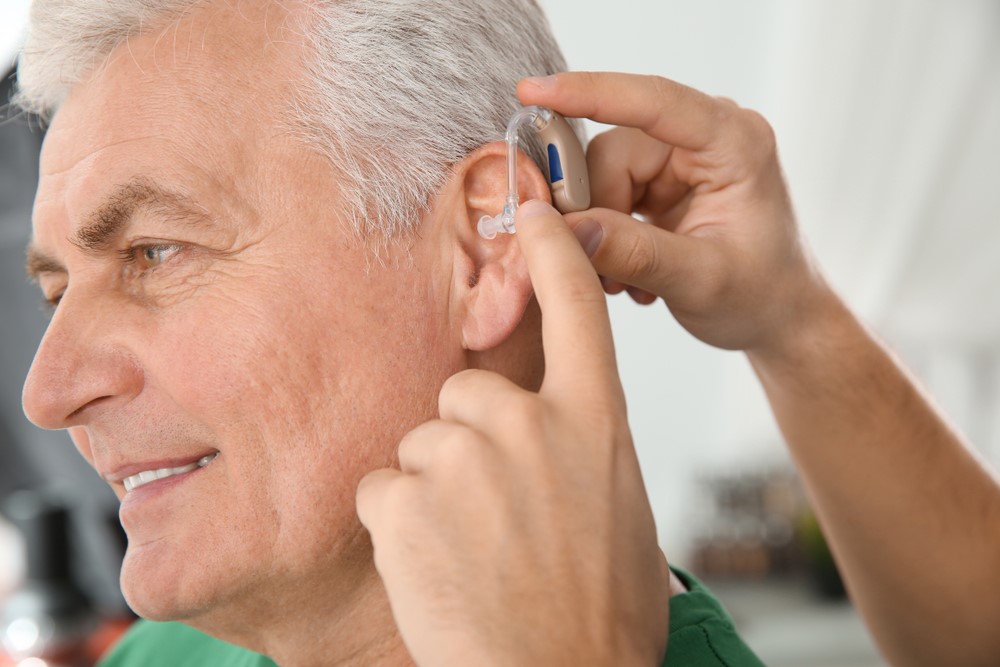
Aging tends to mean that our bodies no longer work like they used to. We’re suddenly faced with extra challenges. Walking may become more difficult, changes to eyesight may make driving dangerous, and there’s the growing fear of dementia.
Losing your hearing is another scary area, but there are ways to make things easier. Many seniors take the cheap option and turn to hearing amplifiers. That’s why this post focuses on hearing aids versus hearing amplifiers.
After all, you don’t want to spend time and energy sourcing a hearing amplifier, just to find that it doesn’t help you.
As part of this discussion, we’ll also look at the cost of hearing aids and how you can pay for them.
What Are Hearing Aids?
Hearing aids are designed to help with hearing loss. They tend to require a prescription and testing, partly because the device needs to be tailored towards the needs of the user.
The power of hearing aids comes from how they can isolate and amplify some frequencies over others. This is an important effect, as hearing loss is rarely uniform.
For example, a good hearing aid can help you to tune into the people talking to you, making them easier to hear over the background noise in the room.
Hearing aids are considered a class 1 medical device and are regulated by the FDA. This can give you confidence that you’re getting a high-quality product. There should also be plenty of support if there are any issues with the hearing aid.
What Are Hearing Amplifiers?
Hearing amplifiers go by many names, including personal amplifiers, personal sound amplifier products (PSAP), digital sound amplifier, or hearing aid amplifier.
The devices are simply designed to improve environmental hearing, boosting all sounds equally. They’re perfect for situations where people need to hear everything around them better, like hunting or parents when children are in a different room.
Some people even use hearing amplifiers when walking in nature, to boost the ambient sounds around them and help promote mindfulness.
Unlike hearing aids, hearing amplifiers aren’t designed to help with hearing loss.
This may be why customers tend to be much happier with hearing aids than with any type of hearing amplifier.
Hearing amplifiers are similar to simply turning up the volume dial on your TV or computer. That process isn’t selective at all, as you increase the volume of everything at once.
If you’re struggling to hear people clearly when they talk, for example, a hearing amplifier might be frustrating. Using one would make the person you’re talking to sound louder, but you’d increase the background noise too, which largely defeats the purpose.
While the number of names might seem confusing, just keep an eye out for the word ‘amplifier’. This means you’re getting some type of hearing amplifier, rather than a hearing aid.
Key Differences Between The Products

- Intent. Hearing aids are designed for people with hearing loss. Hearing amplifiers aren’t. Instead, amplifiers are meant for recreational use by people with full hearing.
- Customization. Hearing aids are customized to account for each person’s individual hearing, which often involves boosting some frequencies more than others. Hearing amplifiers, on the other hand, boost all frequencies equally.
- Testing. The customization means that you need hearing tests before you can get a hearing aid, while hearing amplifiers can be purchased as-is.
- Price. While prices vary for both types of products, hearing aids do tend to be cheaper than hearing amplifiers (they’re often much cheaper).
- Features. Some hearing aids come with extra features, like the ability to adjust them via Bluetooth, digital noise reduction, tinnitus relief, and more. You won’t see most of these features with a hearing amplifier.
- Regulation. Hearing aids are regulated, while hearing amplifiers aren’t.
Interestingly, some hearing amplifiers are designed to look like hearing aids, so you might not be able to tell them apart just by looking at them. Pay attention to the wording that the company uses instead, as only true hearing aids can be called such.
Which Should You Buy?
Hearing amplifiers often seem like a cheap alternative to hearing aids. But honestly, they’re not the same thing at all.
Unless your hearing loss is very minor, a hearing amplifier won’t be enough to bring you back to normal hearing. An amplifier could even be frustrating, as it just makes everything louder, including any noises that you could already hear without a problem.
Frequently Asked Questions
Are Hearing Amplifiers Dangerous?
Hearing amplifiers aren’t dangerous in themselves. However, they can be a problem, because you’re simply compensating for hearing loss, rather than having your hearing tested.
Doing so means that any underlying problems aren’t identified or addressed.
And, here’s the thing, getting help early for hearing loss can make a large difference. It might be possible to reduce further hearing loss or even prevent it entirely. You lose that chance if you never get your hearing tested.
Because of this effect, relying heavily on a hearing amplifier, rather than being tested and getting a hearing aid, could make your hearing worse in the long-term.
That said, it is possible to damage your hearing if you have the hearing amplifier at a very high volume for long periods (just like listening to loud music through headphones). To avoid the problem, make sure that the hearing amplifier is never louder than it needs to be.
Does Medicare Cover Hearing Aids?
As a general rule, no, Medicare doesn’t cover hearing aids themselves, the exams for fitting them, or any related services. This means that, in most cases, seniors need to pay for hearing aids themselves.
Not surprisingly then, you won’t find Medicare support for healing amplifiers either.
The main exception is Medicare Advantage plans. Some of these may cover hearing aids or hearing tests. You’ll need to take a close look at your plan to see what’s covered and what isn’t.
Most of the time though, you’re going to need to pay for your hearing aid and any related appointments.
Are There Over-the-Counter Hearing Aids?
Hearing aids have traditionally been obtained from health professionals and have required a prescription, which is one reason that they’re often expensive.
But, in 2020, changes to deregulation and federal law paved the way for over-the-counter hearing aids.
Unlike hearing amplifiers, OTC hearing aids are designed with hearing loss in mind. Most will be suitable for people with mild to moderate hearing loss.
The devices will be considered medical devices and will be regulated as such by the FDA.
This shift should help to make hearing aids much less expensive. We’re already starting to see this pattern, with a variety of cheaper hearing aids entering the market, including some that you can buy online, from services like Otofonix.
Are Prescription Hearing Aids Better?
Prescription hearing aids could be a better choice in some situations. The following issues, for example, may suggest an underlying medical problem that needs to be addressed.
- Unexpected changes in hearing loss severity, like the hearing loss becoming more severe and then less severe.
- Significant discomfort or even pain in your ears
- Dramatic changes in your hearing, like sudden hearing loss or your hearing getting rapidly worse within a few months
- Significant dizziness
- Any type of discharge, like fluid or blood from your ear
- When your hearing loss is substantially different from one ear compared to other
Plus, if your hearing loss is severe, then an over-the-counter hearing aid mightn’t be powerful enough to help.
How to Find Affordable Hearing Aids
While hearing amplifiers have their uses, they don’t work well for most cases of hearing loss. Instead, you really do need to turn to a hearing aid. Thankfully, there are now more options than ever before.
Feeling Overwhelmed?
Check out our Caregiving Consulting service for personalized support and guidance.

Leave a Reply